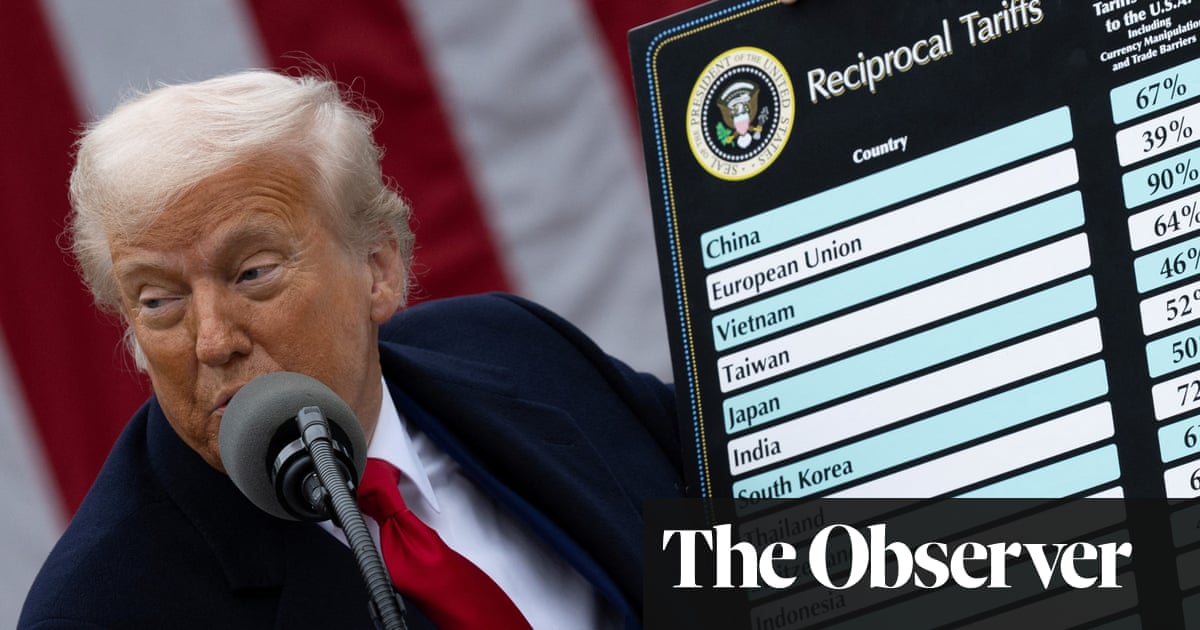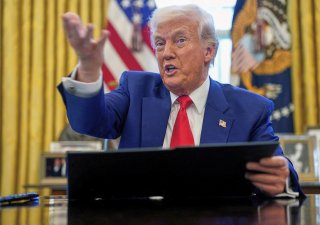“`html
Trump’s “Liberation Day” Tariffs Unleash Global Trade War,Rattling Markets and Workers Alike
By Archyde news Team | April 5,2025
President Trump’s sweeping tariffs have ignited a global trade war,leaving workers like Nguyen Thi Dieu in Vietnam fearing for their livelihoods and economists predicting potential recession in teh U.S.
On Thursday evening, Nguyen Thi dieu and her husband, both employees at a textile factory on the outskirts of Ho chi Minh City, Vietnam, were watching the news. President Donald Trump, over 8,700 miles away, was announcing unprecedented tariffs on goods from virtually every country. The scope was so broad that even uninhabited territories like the Heard Island and McDonald Islands, were not spared, bizarrely incurring a 10% tariff.
Trump’s declaration triggered immediate and severe repercussions. Stock markets worldwide plummeted,wiping out billions in value. For Dieu and her husband, the implications were personal and dire. Their jobs at a Taiwanese-owned factory producing footwear for an American company were now at risk, a stark example of how globalized supply chains are vulnerable to protectionist policies. “Nothing is clear,” Dieu said on Saturday, during a visit to a local market near the industrial zone where she lives. “I feel confused and worried that my job may not be stable.”
The Vietnamese government shared these concerns.The United States is Vietnam’s largest export market, accounting for 30% of the nation’s GDP and fueling its meaningful economic growth. Within hours of Trump’s announcement, the Prime Minister established a “rapid response team,” dispatching Deputy Prime Minister Ho Duc Phoc to Washington for urgent discussions.
“Nothing is clear. I feel confused and worried that my job may not be stable.”
Nguyen Thi Dieu, vietnamese factory worker
global Condemnation and the EU’s Response
The reaction to Trump’s tariffs was swift and overwhelmingly negative across the globe. European leaders voiced strong disapproval, with officials like Olaf Scholz calling the tariffs “fundamentally wrong,” Emmanuel Macron labeling them “brutal and unfounded,” and Pedro Sánchez describing them as “contrary to the interests of millions of people, on both sides of the Atlantic.”
The European media echoed these sentiments.Le Monde characterized the move as “filled with paranoia, vengeance, and coerciveness,” while Italy’s Corriere della Sera called for the EU to threaten “counter-tariffs … to bring the US to the table,” emphasizing that “the EU is being put through what amounts to a stress test. It will need to demonstrate unity.”
Despite the strong rhetoric,the EU initially refrained from immediate retaliation. Ursula von der Leyen, the European Commission chief, expressed disappointment, stating that Europeans felt “let down by their oldest ally” and warning of “dire consequences” for the world economy. However, the EU’s response was measured, aimed at preventing further escalation.
Mujtaba Rahman of the Eurasia group consultancy explained that the EU’s “ultimate aim is to prevent a further escalation, bring the US to the table, and explore paths to mutually rolling back transatlantic trade barriers.” Brussels hopes to use “a combination of counter-duties, threats and offers” to limit the damage to the EU-U.S. trade relationship, which amounted to over €1.6 trillion (£1.3 trillion) in 2023.
the potential impact on Europe is substantial. Trump’s “liberation day” tariff of 20% on almost all EU exports to the U.S. follows earlier 25% levies on steel, aluminum, cars, and car parts. In total, roughly 70% – or €380 billion – of EU exports to the U.S. are now subject to these tariffs. EU officials estimate that these measures would generate about €80 billion for the U.S. treasury, assuming trade volumes remain constant, which is unlikely. Economists predict that EU exports to the U.S. could decline by as much as 50% in the medium term.
The EU’s cautious approach also reflects the difficulty in achieving consensus among its 27 member states, each with its own vested interests. As an example, France, italy, and Ireland are lobbying to exclude bourbon whiskey from the list of retaliatory tariffs, fearing that Trump will impose a 200% duty on European wines and spirits in response. These countries argue that the economic damage from targeting bourbon would outweigh the benefits,as EU countries import only about €500 million of bourbon annually but export €8 billion of wine and spirits to the U.S.
Ignacio García Bercero, a former senior EU trade negotiator, emphasized the need to “maximise the political impact [on the US], and limit the economic impact [to the EU]”.
One area where the EU holds leverage is in services.While Trump focuses on the $236 billion U.S. trade deficit with the EU in goods, the U.S. enjoys a €109 billion trade surplus in services with the EU. Restricting U.S. companies’ access to EU public procurement tenders or markets in sectors like banking, financial services, and big tech could serve as a powerful countermeasure, though this remains a last resort.
According to an EU official, the EU is “buying the space we need to negotiate, and looking at targeting our response in the most effective way
What are the potential long-term consequences for the EU economy if exports to the U.S. decline by as much as 50%, as projected by economists?
Archyde Interview: Analyzing the Economic Fallout of Trump’s Tariffs
By the Archyde News Team | April 6, 2025
Interview with Dr. Anya Sharma, Lead Economist at Global Trade Analysis
Archyde: Welcome, Dr. Sharma. Thank you for joining us today to discuss the recent implementation of President Trump’s tariffs. The markets have been in turmoil. Can you give us a broad overview of the economic impact we’re seeing?
Dr. Sharma: Thank you for having me. The immediate impact, as we’ve seen, is meaningful.The stock market reacted vrey negatively, with a considerable drop in value globally. The S&P 500 experienced a record two-day decline. This is a direct consequence of the uncertainty created by these new tariffs and the potential for a global trade war.
Archyde: The article highlights concerns for workers in countries like Vietnam. Can you elaborate on how tariffs affect workers and supply chains?
Dr. Sharma: Absolutely. The imposition of tariffs disrupts established supply chains. Manufacturers who rely on exporting goods to the US now face higher costs.This can lead to reduced production, layoffs, such as the worries of the factory worker, and ultimately, economic hardship for workers reliant on those industries. We’re seeing this vulnerability first-hand.The knock-on effects can spread across nations, exacerbating the economic strain.
Archyde: European leaders have expressed strong disapproval. The EU is a major trading partner. What strategic options does the EU have at this stage?
Dr. Sharma: The EU is in a tough spot.They can retaliate with counter-tariffs, but this risks an escalation of the trade war, further hurting their own economies. The EU has to tread carefully. I believe the EU will attempt to negotiate. The goal is to de-escalate the situation, and hopefully find a solution that benefits both parties, while carefully protecting their industries from the damaging “liberation day” tariffs.
Archyde: The article mentioned potential declines in EU exports to the U.S. What are the long-term projections for trade between the U.S. and the EU?
Dr. Sharma: Economists predict a significant decrease in EU exports to the United States, potentially reaching as much as 50% in the medium term, which is a very real threat to the health of the European economy, and could be used to destabilize it. While these are projections, if maintained for a considerable period of time, this could cause a mild recession in some nations.
Archyde: Dr. Sharma, thank you for shedding light on this complex situation. Considering all the economic risks, what would be the single most crucial step needed for global trade to recover?
Dr. Sharma: The most crucial step would be meaningful dialog and negotiation. The best way to limit the damage is for all involved parties to negotiate a swift end to the escalation, which means that talks must involve the EU, Vietnam, the US and any other country which suffers from the tariffs. Without this cooperation, we’re looking at a prolonged period of instability and economic damage.
Archyde: Thank you, Dr. Sharma, for your valuable insights. We appreciate you taking the time to speak with us.





